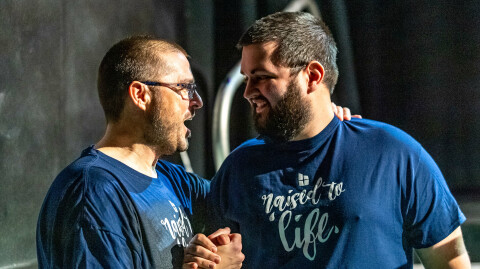
Do you remember the last time you learned a new skill? I'm not talking about something simple, like how to mow the lawn or fry an egg. I'm talking about learning something that has layers of intricacy that requires a lot of effort, intention, and practice.
I'm currently watching my two oldest daughters learn how to play the game of volleyball. It has been a lot of fun seeing them develop new skills and learn to play alongside other girls. It is also interesting to see the difference between my oldest daughter and my middle daughter. My oldest has only played for two years longer than her sister but it is amazing to see how much better her skills are and how much more advanced the level of play is.
So, how are these girls developing their volleyball skills and increasing their knowledge and ability?
Consider these 4 ways that children develop new skills.
1. Teaching/Coaching
They are spending time with coaches and teachers who know more than they do and are teaching them the things they need to know and the proper skills to succeed.
2. Practice
Regular and consistent time is set aside for them to practice their skills. Repetition is a big part of this. For example, they will never be good at serving unless they do it over and over and over again.
3. Watching
As they watch others who are better than them (or even at the same skill level), they are picking up tips and tricks on strategy, rules, and execution for playing the game. They spend time in an environment that helps to foster their growth in the sport.
4. Playing
They can spend all the time they want practicing, watching, and sitting under coaching, but at some point, they have to actually play the game. They need to be able to put what they are learning and practicing into action in an actual live-game experience in order to continue to grow, develop, and mature as volleyball players.

Do children develop their faith in the same way?
Okay, so why are we talking about how to get better at volleyball (or any other sport or skill)? I want to pose this question for us: When it comes to the faith development of our children, is it done the same way? I think the answer is both yes and no. We will look at both similarities and differences.
Let's look at some similarities first.
1. Kids need a faith teacher/coach . . . even a whole group of them. We can't expect our kids to learn about faith in Jesus and the truth of Scripture on their own. They need to be taught, guided, and developed. This takes both time, effort, and intentionality.
2. Kids need to practice many of the disciplines that will help to form and develop their faith. They can be taught how to read the Bible, but they need to practice reading and studying it on their own. They need to practice thinking through different scenarios that they may encounter and work on developing a biblical worldview that will help them know how to think and act toward those types of situations.
3. Kids also need to be in an environment where they are consistently seeing other, more mature Christians living out their faith in all types of situations. They will learn from seeing and listening to others pray, care for one another, control their temper, and love like Jesus through service and sacrifice. They will benefit and grow through watching people go through hardship but maintain resiliency in their faith in Jesus.
4. Lastly, kids need to not be looked at as too young to live a life of faith. They need to be encouraged to live out their faith in the here and now, no matter what environment that is. Active participation in the life of the Church is an excellent place to start. They can find ways to boldly honor Jesus and love others for his glory in their schools. A life of faith is not only practiced as an adult but should absolutely be lived out in the younger years.
Now, let's also look at some differences.
That all makes logical sense. So, how might the faith development of our kids not mimic the learning of a new skill or sport?
The Bible is very clear that God has placed kids in the care of their parents for them to be taught about who he is and for the development of their faith (Deuteronomy 6; Psalm 78; Genesis 18).
While we may have the opportunity to coach our children or teach them a skill that we have mastered already on our own, our typical method is to take them to an expert or professional to be taught these things and have their skills developed. God's plan for our child's discipleship is different from this. We are to be the ones on the front lines!
It is incredibly tempting to view the Church as the place to take our kids so that they can learn about God. As parents, though, this would be an abdication of our role.
Julie Kurz, in her book For the Faith of the Next Generation: A Resource for Ministry Leaders and Parents, says this: "We missed the fact that the transfer of faith and spiritual development is not in the same category as learning a skill, such as sports, music, or dance, and we overlooked the critical role of parents in the process of faith development."

As parents, we must guide our children and partner with the Church.
As parents, we have (by far) the greatest number of influencing hours with our children. This is God-ordained! We aren't supposed to be spending the majority of our time with them carting them around to a bunch of different experts, especially not for their faith development. Instead, we should be taking the lead with incredible intentionality as well as partnering with the Church for the sake of our child's faith development. Watch how this works:
1. We take the lead in teaching our kids the Bible. We read it to them. We talk about it with them. We explain it. We help them understand it. Then, when at church, another trusted voice is able to reinforce their learning and help them in their understanding. Partnership!
2. We get to help our kids practice living out their faith at home. We can not only teach them how to read the Bible, pray, and love others, but we can help them learn how to do this on their own, being close by to help with any guidance or answers to questions. At church, they will have the opportunity to practice grace, mercy, sacrifice, serving, and forgiveness with other members of the body of believers. Partnership!
3. Our kids are always watching us, aren't they? We don't always do things right or act the way we had hoped, but with young eyes watching us, we can emulate and show them what it looks like to live a life of faith day in and day out. They can learn so much from watching how we handle different situations and the rhythms that we build into our lives as followers of Jesus. At church, every week they get to be around other believers, watching them worship, interact with each other, serve, and act as a fellow believer. Partnership!
4. Together as a family, you can lead your child to actual and practical times of service, love, and care. This can be toward brothers and sisters or other family members as well as others in the neighborhood and community. We can lead them toward prayer in difficult situations and patience in waiting on God. At church, kids can be a part of worship services, serving, and praying for other people. They can get practice as a believer and practice as a part of the body of believers as they act as the believing body. Partnership!
Parents . . . let's take the lead!
I think the challenge for us as parents is clear: Let's not take our kids to the experts for their discipleship and faith development. We are called to take the lead, walking right alongside them, and to welcome the needed partnership of the Church in this process.




